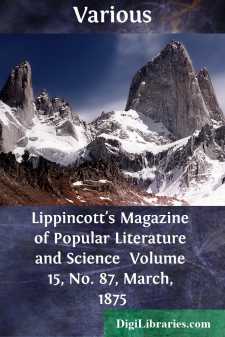Categories
- Antiques & Collectibles 13
- Architecture 36
- Art 48
- Bibles 22
- Biography & Autobiography 813
- Body, Mind & Spirit 142
- Business & Economics 28
- Children's Books 14
- Children's Fiction 11
- Computers 4
- Cooking 94
- Crafts & Hobbies 4
- Drama 346
- Education 46
- Family & Relationships 57
- Fiction 11829
- Games 19
- Gardening 17
- Health & Fitness 34
- History 1377
- House & Home 1
- Humor 147
- Juvenile Fiction 1873
- Juvenile Nonfiction 202
- Language Arts & Disciplines 88
- Law 16
- Literary Collections 686
- Literary Criticism 179
- Mathematics 13
- Medical 41
- Music 40
- Nature 179
- Non-Classifiable 1768
- Performing Arts 7
- Periodicals 1453
- Philosophy 64
- Photography 2
- Poetry 896
- Political Science 203
- Psychology 42
- Reference 154
- Religion 513
- Science 126
- Self-Help 84
- Social Science 81
- Sports & Recreation 34
- Study Aids 3
- Technology & Engineering 59
- Transportation 23
- Travel 463
- True Crime 29
Lippincott's Magazine of Popular Literature and Science Volume 15, No. 87, March, 1875
by: Various
Description:
Excerpt
AN ESCAPE FROM SIBERIA.
RUFIN PIOTROWSKI.All the languages of continental Europe have some phrase by which a parting people express the hope of meeting again. The French au revoir, the Italian ÐÑ rivederla, the Spanish hasta mañana, the German Auf Wiedersehen,—these and similar forms, varied with the occasion, have grown from the need of the heart to cheat separation of its pain. The Poles have an expression of infinitely deeper meaning, which embodies all that human nature can utter of grief and despair—"To meet nevermore." This is the heart-rending farewell with which the patriot exiled to Siberia takes leave of family and friends.
There is indeed little chance that he will ever again return to his country and his home. Since Beniowski the Pole made his famous romantic flight from the coal-mines of Kamschatka in the last century, there has been but a single instance of a Siberian exile making good his escape. In our day, M. Rufin Piotrowski, also a Polish patriot, has had the marvelous good-fortune to succeed in the all but impossible attempt; and he has given his story to his countrymen in a simple, unpretending narrative, which, even in an abridged form, will, we think, be found one of thrilling interest.
In January, 1843, we find Piotrowski in Paris, a refugee for already twelve years, and on the eve of a secret mission into Poland of which he gives no explanation. By means of an American acquaintance he procured a passport from the British embassy describing him as Joseph Catharo of Malta: he spoke Italian perfectly, English indifferently, and was thus well suited to support the character of an Italian-born subject of Queen Victoria. Having crossed France, Germany, Austria and Hungary in safety, he reached his destination, the town of Kamenitz in Podolia, on the Turkish frontier. His ostensible object was to settle there as a teacher of languages, and on the strength of his British passport he obtained the necessary permission from the police before their suspicions had been roused. He also gained admission at once into the society of the place, where, notwithstanding his pretended origin, he was generally known as "the Frenchman," the common nickname for a foreigner in the Polish provinces. He had soon a number of pupils, some of them Poles—others, members of the families of Russian resident officials. He frequented the houses of the latter most, in order not to attract attention to his intercourse with his compatriots. He spoke Russian fluently, but feigned total ignorance both of that and his own language, and even affected an incapacity for learning them when urged to do so by his scholars. Among the risks to which this exposed him was the temptation of cutting short a difficult explanation in his lessons by a single word, which would have made the whole matter clear. But this, although the most frequent and vexatious, was not the severest trial of his incognito. One day, while giving a lesson to two beautiful Polish girls, daughters of a lady who had shown him great kindness, the conversation turned upon Poland: he spoke with an indifference which roused the younger to a vehement outburst on behalf of her country....












